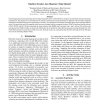Free Online Productivity Tools
i2Speak
i2Symbol
i2OCR
iTex2Img
iWeb2Print
iWeb2Shot
i2Type
iPdf2Split
iPdf2Merge
i2Bopomofo
i2Arabic
i2Style
i2Image
i2PDF
iLatex2Rtf
Sci2ools
LREC
2010
2010
An Associative Concept Dictionary for Verbs and its Application to Elliptical Word Estimation
Natural language processing technology has developed remarkably, but it is still difficult for computers to understand contextual meanings as humans do. The purpose of our work has been to construct an associative concept dictionary for Japanese verbs and make computers understand contextual meanings with a high degree of accuracy. We constructed an automatic system that can be used to estimate elliptical words. We present the result of comparing words that were estimated both by our proposed system (VNACD) and three baseline systems (VACD, NACD, and CF). We then calculated the mean reciprocal rank (MRR), top N accuracy (top 1, top 5, and top 10), and the mean average precision (MAP). Finally, we showed the effectiveness of our method for which both an associative concept dictionary for verbs (Verb-ACD) and one for nouns (Noun-ACD) were used. From the results, we conclude that both the Verb-ACD and the Noun-ACD play a key role in estimating elliptical words.
| Added | 29 Oct 2010 |
| Updated | 29 Oct 2010 |
| Type | Conference |
| Year | 2010 |
| Where | LREC |
| Authors | Takehiro Teraoka, Jun Okamoto, Shun Ishizaki |
Comments (0)

